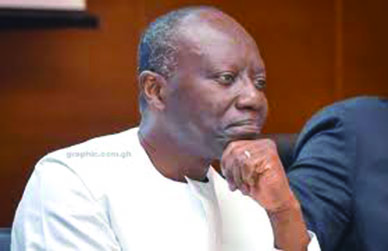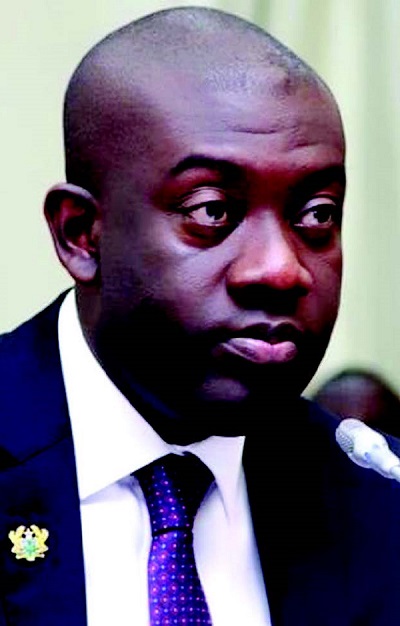
To say that the noise being made about our current talks with the IMF about a rescue programme is déjà vu is to state the odiously obvious.
We had a similar outpouring of wishful thinking about economic issues in 1966 (under the E. N. Omaboe economic “kingdom”; next came the J H Mensah era (when one of our most brilliant economists was denied a hearing by his own Prime Minister and groups of IMF agents from Harvard and Oxford Universities, gained ascendancy over home-grown experts whose word should have been better appreciated by a professor of sociology); then came the Kwesi Botwe “kill the Cedi in order to save it” diktat….)
Wow! When will the argumentation stop? When will we realise that as a lending institution, the IMF couoldn’t care less what would-be borrowers think or say about it? The IMF, Beloved Countrymen and Women, does not force anyone to come and beg it to send it into an early grave.
The IMF cojes; the IMF decrees: if the IMF decrees are agreed upon, the IMF pays. It then goes to sit in America and watches its handiwork produce whatever result it intended it to produce.
Lesson? If you don’t want trouble, don’t mismanage your economy in such a way that you’d need to go to the IMF to try to survive.
In other words, cut your coat acording to your cloth. If you don’t, and you have to go to the IMF, expect your bloated coat-tails to be unceremoniously exposed by the worthless brass buttons sewn into the garment.
Yes, please keep quiet. The IMF is like a mortgage lender in England. You borrow from it at what you consider to be an affordable “variable” interest rate. But then, a few years on, the Bank of England raises interest rates “as high as necessary” [to quote Norman Lamont, one-time Chief Secretary to the Treasury, during Margaret Thatcher’s npremiership]. And you face penury.
How can a person who is fully employed be thrown into penury by a Government policy decision? Ha – that is one of the “benefits” of what is called a “laisser-faire” economy. Someone in the USA launches “sub-prime” mortgage “products” which are copied by other financial operators, including many that are trusted as enterprises run by personnel of integrity. But suddenly these huge enterprises face liquidation because they have been presenting the public with unreliable figures about their performance.
However, their crimes are covered up by governments, which decide that the comanies “are too big to be nallowed to fail”. You, the small man, on the other hand, are allowed to be thrown out of your house – withy your family, of course — because with the high interest rates imposed by those same government, your mortgage repayments have trebled or even quadrupled, over a few years.
Yes: if you are a small player, borrow from big lenders at your peril. In Ghana’s case, as soon as I saw people in our government boasting about how bonds they had floated overseas had been “over-subscribed “because of the faith overseas lending institutions had placed in Ghana’s economic management, I clenches my teeth.
Had they not heard about how the Nkrumah regime was duped by “entrepreneurs” from abroad who “pre-financed” projects for it, at cut-throat prices, and then got their Governments to pressurise succeeding regimes to repay those “debts”? Had they not heard that the Acheampong NRC regime “repudiated” some of these “debts” for being “tainted with corruption”, as well as with the “over-invoicing of imports and the under-invoicing of exports” relating to projects?
If this were a country in which traditions are valued, I would suggest that each incoming Government should be subjected to an intensive study of Ghana’s economic history before being allowed to take office. But “institutional memory” is one of the most glaring absentees from our public life.
Well, I want to tell everyone to keep quiet and allow our negotiators to do the best they can to reach agreement with the IMF, bearing in mind, all the time, that the Breton Woods institutions were established after the Second World War, to entrench capitalist values in the world.
And capitalist institutions do not do pity. Nor do they do sympathy. Therefore countries that go to them must go with their eyes fully open.
You ask me: so what should we do? My answer is this: lay aside some money to make your economy as self-sufficient as possible. Add value to your exports before you sell them. Does this with DEEDS not WORDS.
We have heard that we need to add value to our exports for so many years. But where do we find our chocolates in the shops of the countries whose people enjoy chocolates?
These countries still buy raw cocoa from us and manufacture it into chocolates. Years ago, when our cocoa industry was threatened with the “swollen shoot” disease, a well thought out scheme was implemented, whereby a “Cocoa Rehabilitation” division was set up under the Department of Agriculture to work with cocoa farmers to save the ndustry. Within a matter of two decades or less, our cocoa production had increased at least five-fold.
And guess what? As we worked to save the cocoa crop, the manufacturers worked to perpetuate the fluctuattions in the earnings of cocoa producers. Yes, we were taxed to fulfill the laisser-faire objectives of supply and demand! We still are.
We should also encourage our existing entrepreneurs, and create new ones, to enter fields which will enable us to maximise our earnings from the opportunities which the progress we are making towards creating an African common market area will be progressively opening to us.
Incidentally, what is the current situation regarding co-operation between Ghana and the Ivory Coast over the creation of a common mechanism for marketing cocoa in the two countries? We often make heart-warming announcements about such schemes. And then we seem to leave them to rot in files.
Finally, I hope the Ukrainian situation will persuade us to take agriculture more seriously.
The shortage of wheat resulting from the Russian invasion of Ukraine should reinvigorate our efforts at producing maize, and also cassava (which I believe can be mixed with maize and/or millet in the production of bread.)
Certainly, it is a shame that we should be importing ANY vegetables from places like Burkina Faso, for we share basically the same climatic conditions as them.
I hope that if the current IMF palaver does nothing else for us, at least it will give us a kick in the butt to put and end to our nonchalant attitude to issues relating to our economic survival.
For it is a pity that we keep going to the IMF to say the same things, get the same conditionalities and take them hoe to cry over them!
CORRECTION:
We inadvertently published a headline to the wrong story. We are sorry for the inconvenience.
By Cameron Duodu





